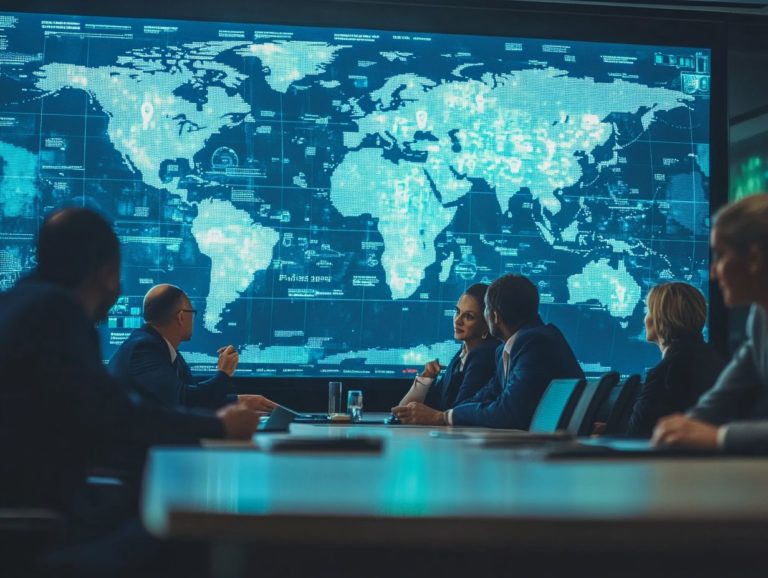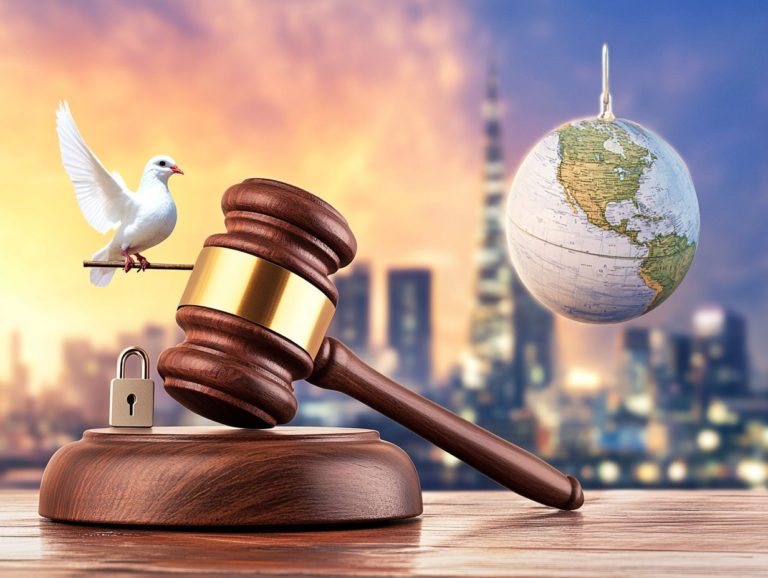The Role of National Courts in International IP
In an increasingly interconnected world, you cannot underestimate the significance of International Intellectual Property (IP) laws. This article delves into the intricate landscape of international IP regulations and highlights the essential role that national courts play in enforcing these laws.
You will gain insights into jurisdictional challenges and explore real-world case studies that illustrate how national courts handle international disputes. The discussion extends to collaborations with international organizations, offering a glimpse into what the future may hold for IP protection.
Join in as you unpack the vital intersection of national and international legal frameworks, all dedicated to safeguarding intellectual property.
Contents
- Key Takeaways:
- The Basics of International Intellectual Property (IP)
- National Courts and their Role in International IP
- Challenges and Limitations for National Courts in International IP
- Case Studies: National Courts and International IP Disputes
- Collaboration Between National Courts and International Organizations
- The Future of National Courts in International Intellectual Property
- Frequently Asked Questions
- What is the role of national courts in international intellectual property (IP) disputes?
- How do national courts address international IP disputes?
- What laws do national courts apply in international IP disputes?
- Can national courts enforce decisions made by foreign courts in international IP disputes?
- What are the advantages of resolving international IP disputes through national courts?
- What are the potential drawbacks of resolving international IP disputes through national courts?
Key Takeaways:
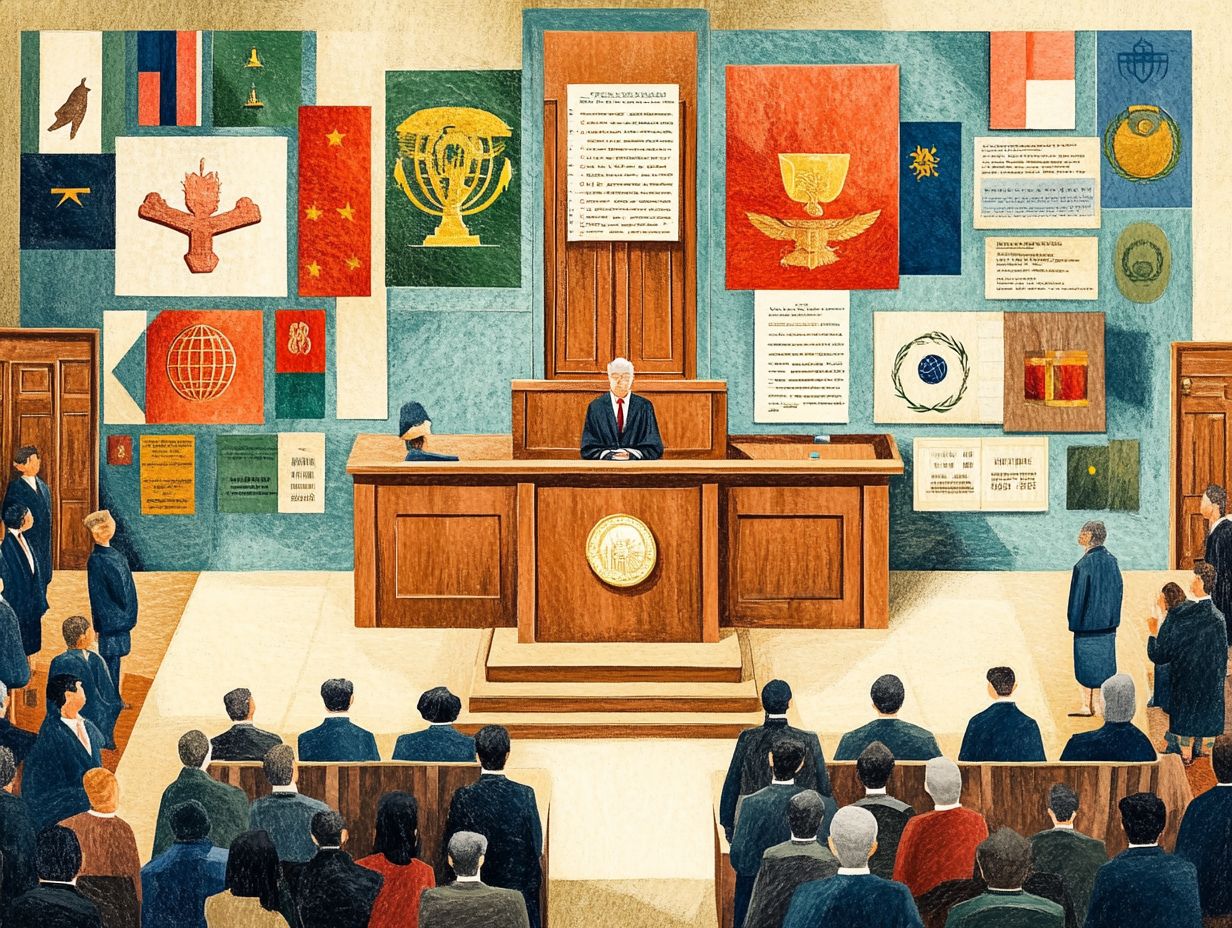
National courts play a crucial role in enforcing international IP laws and protecting intellectual property rights, as discussed in the role of social media in international IP law.
Legal and practical obstacles can hinder the effectiveness of national courts in handling international IP disputes.
Collaboration between national courts and international organizations is key to improving IP protection and enforcement.
The Basics of International Intellectual Property (IP)
International Intellectual Property (IP) includes laws designed to protect the rights of creators globally. These laws help you, as an inventor or artist, defend your creations against unauthorized use.
As industries evolve, the significance of intellectual property becomes ever more pronounced. It fosters innovation and creativity while driving economic development. It also addresses the public interest in IP protection through specialized courts and expert judges, ensuring that your rights are upheld in a rapidly changing landscape.
Overview of International IP Laws and Regulations
The framework of international IP laws and regulations offers a cohesive approach to protecting intellectual property across borders. This includes copyright laws, trademark rights, and patent disputes.
In this global arena, key players like the World Intellectual Property Organization (WIPO) and agreements such as the Trade-Related Aspects of Intellectual Property Rights (TRIPS) take center stage. These entities set forth norms that member states are encouraged to adopt, fostering a level of consistency in IP protection.
However, the impact of such legislation can vary widely across jurisdictions, often shaped by local cultural and economic contexts. This divergence highlights the importance for judicial bodies to establish a consistent case law framework.
Consistent rulings not only enhance judicial expertise, but also create a clearer pathway for dispute resolution. Procedural rules that support these ideals are essential for navigating the complexities that arise in cross-border IP issues.
National Courts and their Role in International IP
National courts are essential for enforcing IP laws. They provide the necessary jurisdiction for resolving IP disputes, encompassing patents, copyrights, and trademarks, while understanding the role of the USPTO in IP litigation is also crucial.
By interpreting legal principles rooted in domestic laws and international agreements, these courts ensure that IP rights are upheld effectively within their jurisdictions.
The importance of national courts lies in their ability to balance enforcement mechanisms that foster innovation and creativity with the need for judicial independence and the public interest. This is particularly relevant in an era characterized by increased forum shopping and cross-border disputes.
Jurisdiction and Enforcement of Your Rights to Creative Works
It’s vital to grasp how international IP laws apply to you! Understanding jurisdiction and enforcement is crucial for ensuring your rights are protected across various territories. However, navigating this landscape can be quite complex.
The principle of territoriality means IP laws differ significantly from one nation to another. This can lead to conflicts and confusion for you as a rights holder. Each jurisdiction has its own legal framework, making it challenging to achieve consistent enforcement. The absence of harmonized regulations on an international scale complicates litigation and claims.
Effective enforcement mechanisms like cease-and-desist orders and injunctions are vital. Their success is influenced by the local judicial environment.
Investment protection agreements are laws that help protect your investments in other countries. They provide avenues for recovering damages and ensure your creative works are treated with respect, adding another layer of security in this intricate landscape.
Challenges and Limitations for National Courts in International IP
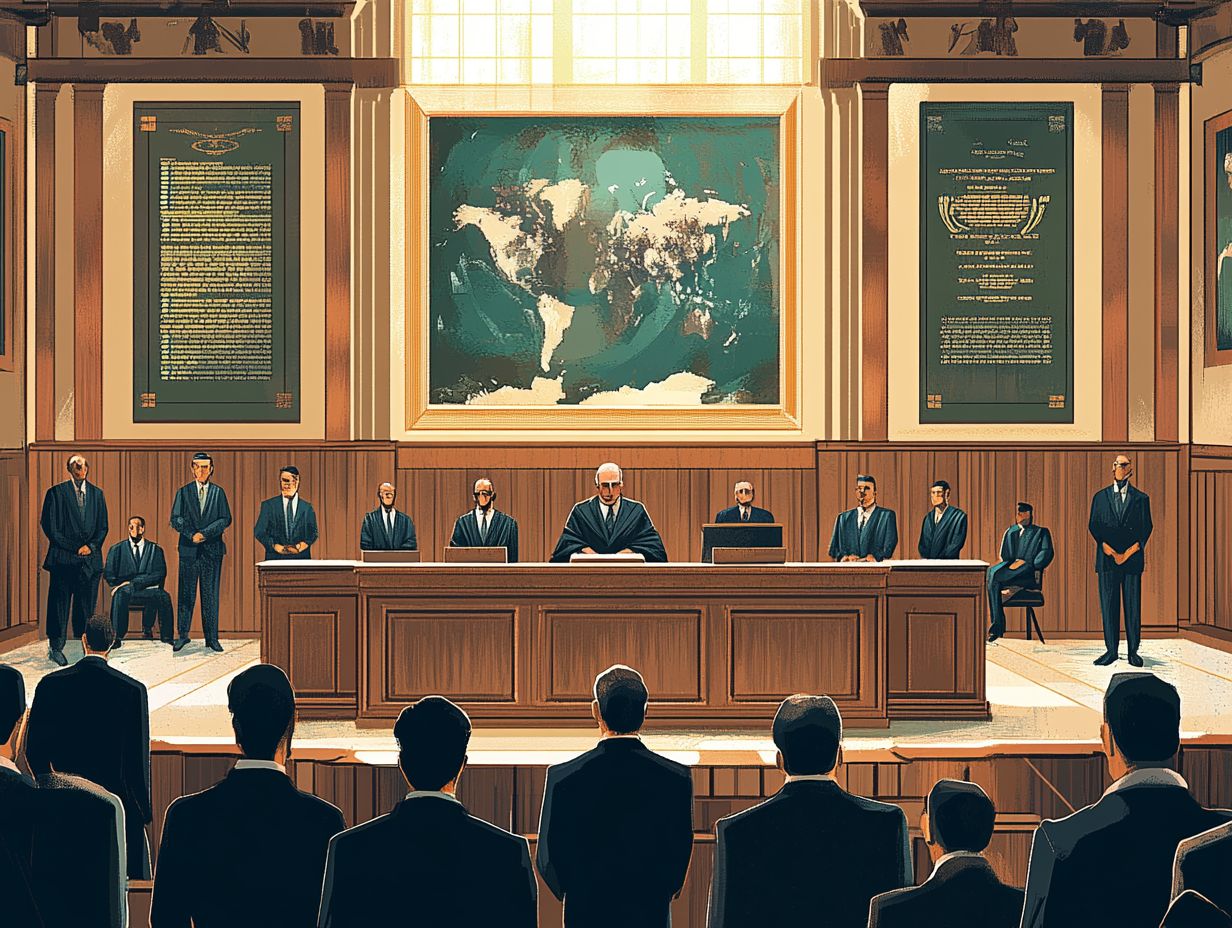
National courts face many challenges when it comes to effectively handling international IP disputes. Legal and practical obstacles can significantly hinder judicial independence and fair access to justice.
Forum shopping complicates the resolution process, as parties often seek out jurisdictions that may favor their claims.
The addition of investment arbitration mechanisms complicates things, affecting the procedural tools available to judges and the overall efficiency of judicial processes.
Legal and Practical Obstacles
Legal and practical obstacles create substantial barriers for you in resolving international IP disputes within national courts. These challenges often arise from inadequate legal frameworks that struggle to protect the complexities of your rights.
Limited access to justice makes it tough for you to get the help you need, making it difficult to navigate a convoluted legal landscape that isn t designed for IP law.
Moreover, insufficient judicial expertise in IP matters leaves judges unprepared to deliver informed rulings. Procedural rules like overly stringent evidence requirements or delays in hearings can significantly hinder your pursuit of justice, stalling timely resolutions.
Case Studies: National Courts and International IP Disputes
Case studies of national courts tackling international IP disputes provide invaluable insights into the effectiveness of legal frameworks and enforcement mechanisms, highlighting the role of technology in shaping international IP law.
They highlight both successful and unsuccessful outcomes, showing how differing interpretations of court jurisdiction impact you as a rights holder. This underscores the importance of specialized knowledge in complex legal landscapes.
By examining these instances, you gain a deeper understanding of the broader implications for innovation and economic development, along with the challenges of maintaining judicial independence and serving the public interest.
Examples of Successful and Unsuccessful Cases
Analyzing examples of cases in national courts sheds light on the complexities involved in enforcing your rights.
Take, for instance, the landmark case of Google LLC v. Oracle America, Inc. This case showcased the delicate balance between copyright protections and fair use, highlighting how courts interpret software as creative work. The ruling set important precedents that may influence future litigation in the tech sector.
Similarly, consider another notable case where decisions regarding trademark enforcement revealed how intricacies of evidence and procedural adherence influence outcomes.
The enforcement mechanisms at play like injunctions or monetary damages are crucial in determining these results. Ultimately, these decisions impact the broader IP landscape, establishing standards for compliance and infringement that you must navigate.
Stay informed to protect your creative works!
Collaboration Between National Courts and International Organizations
Collaboration between national courts and international organizations is vital for elevating intellectual property (IP) protection and enforcement on a global scale. These partnerships pave the way for enhanced judicial training and the development of sophisticated legal frameworks.
Organizations like the World Intellectual Property Organization (WIPO) play a crucial role in setting standards and fostering practices that promote cooperation among judicial bodies. This ensures consistency in the resolution of IP disputes worldwide.
By uniting their efforts, these entities tackle shared challenges and work to ensure that the legal principles governing IP are not only upheld but also evolved to meet the demands of an increasingly interconnected global economy.
Efforts to Enhance Intellectual Property Protection and Enforcement

This effort includes strategic approaches that strengthen national courts while refining judicial training.
Organizations like the World Intellectual Property Organization (WIPO) and the United Nations Office on Drugs and Crime (UNODC) often lead these initiatives. They introduce specialized programs designed to elevate global legal standards.
Emphasizing international cooperation is essential in these endeavors. Countries share best practices and resources to streamline patent and copyright enforcement.
Engaging in collaborative training workshops and establishing cross-border legal frameworks contribute to a more consistent interpretation of intellectual property laws.
This synergy boosts judicial efficiency and fosters greater confidence among businesses, ultimately stimulating innovation and driving economic growth.
The Future of National Courts in International Intellectual Property
The future of national courts in the realm of international intellectual property is on the brink of significant evolution. This transformation is driven by changes in the legal landscape, such as a shift towards alternative dispute resolution mechanisms and an increasing emphasis on the role of IP lawyers and judicial independence.
As global commerce expands, national courts must adapt to new paradigms in addressing intellectual property disputes. This adaptation will reflect changes in legal frameworks and enforcement practices that prioritize both efficiency and equitable access to justice.
Your ability to navigate these changes is essential in fostering an environment that nurtures innovation and creativity.
Predictions and Potential Changes in the Legal Landscape
Predictions about the future of the legal landscape for IP disputes indicate a shift toward more integrated approaches to judicial processes and enforcement mechanisms.
As changes occur, legislation may evolve to harness advanced technology, aiming for quicker resolutions of conflicts. This integration could streamline processes, making them more accessible for everyone involved.
You can expect judicial practices to incorporate artificial intelligence tools that assist in case assessments and predictive analytics, enhancing decision-making efficiency. With these changes, traditional paradigms of IP enforcement may undergo significant transformations, possibly leading to faster adjudications and clearer guidelines.
It’s essential for you and other stakeholders to adapt proactively to these shifts, ensuring you remain competitive and compliant in this rapidly evolving landscape.
Frequently Asked Questions
Explore some common questions about the role of national courts in international intellectual property, along with insights on the role of WIPO in international IP law.
What is the role of national courts in international intellectual property (IP) disputes?
National courts play a crucial role in the resolution of international IP disputes by providing a forum for parties to seek legal remedies for infringement of their IP rights, as outlined in understanding the role of the court in IP litigation.
How do national courts address international IP disputes?
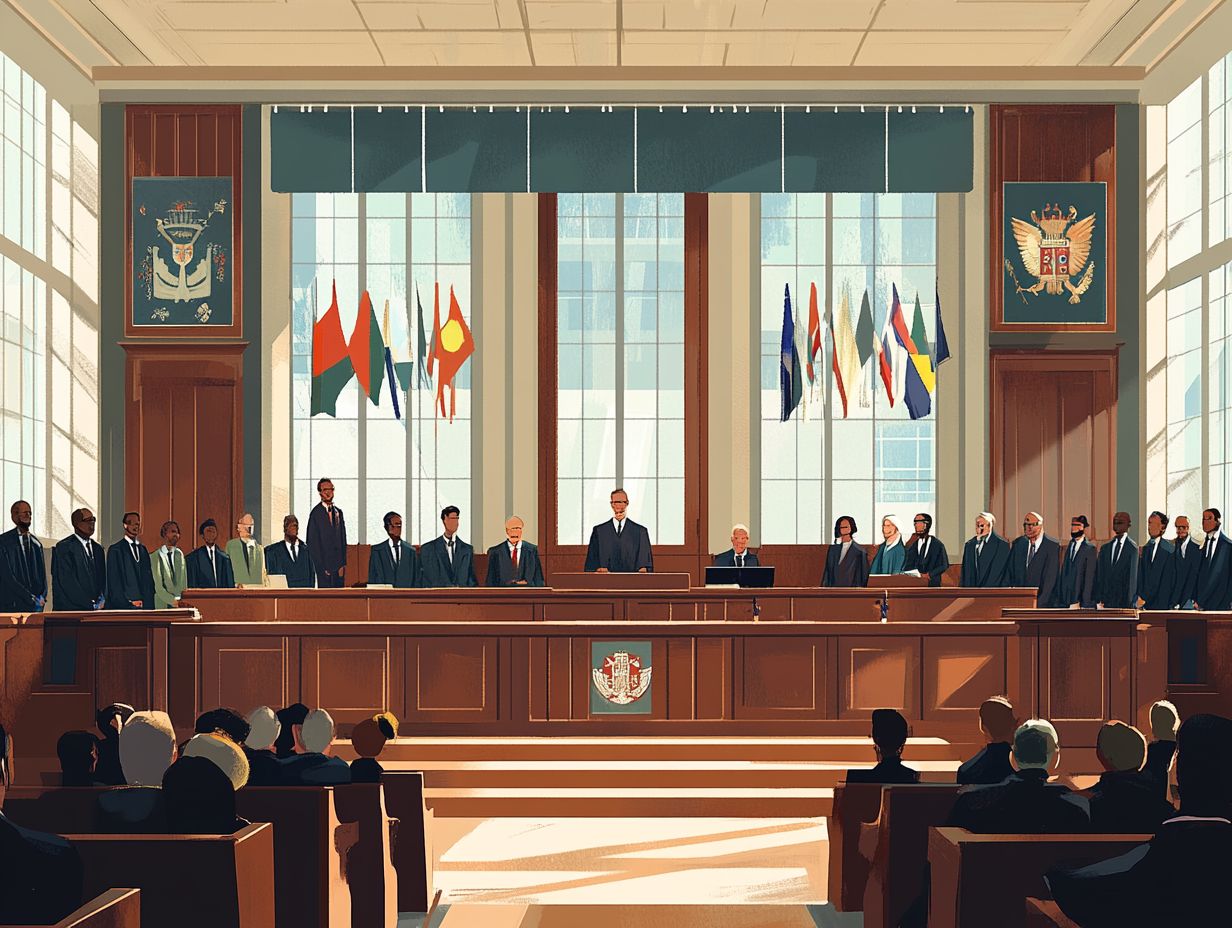
National courts have legal authority (the power to make legal decisions) to hear international IP disputes when the alleged infringement takes place within their territory or when the parties have agreed to submit to their authority through a contract.
What laws do national courts apply in international IP disputes?
National courts apply domestic laws and international treaties. This includes the Paris Convention for the Protection of Industrial Property and the Agreement on Trade-Related Aspects of Intellectual Property Rights (TRIPS).
Can national courts enforce decisions made by foreign courts in international IP disputes?
Yes, they can enforce decisions made by foreign courts. This is done through the recognition and enforcement of foreign judgments, though there are certain conditions.
What are the advantages of resolving international IP disputes through national courts?
Using national courts gives parties access to a reliable court system. Experienced judges help ensure a fair resolution.
What are the potential drawbacks of resolving international IP disputes through national courts?
However, there are some drawbacks. Issues include varying interpretations of laws, potential language barriers, and the costs and time involved in litigation abroad.


